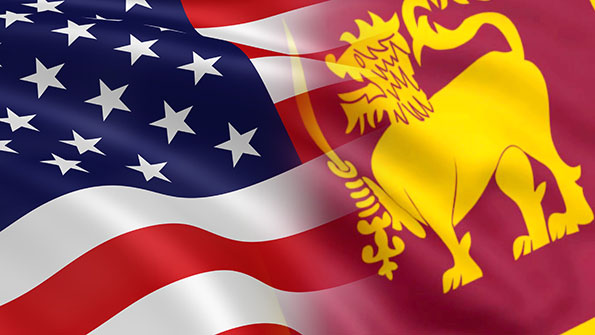US admits it’s not perfect, but will continue to advocate universal rights

The United States yesterday admitted that it was not perfect and was striving to improve its democracy, but that did not mean it would not speak out when human rights were violated in other parts of the world.
Visiting U.S Deputy Assistant Secretary of State for South and Central Asian Affairs, Jonathan Henick responding to questions during an interaction with a group of journalists at the American Centre in Colombo, said there was a misconception that the U.S was unfairly targeting Sri Lanka on issues pertaining to human rights and accountability, but it criticised even its closest allies in the European Union.
“Some European countries in turn, condemn us for enforcing the death penalty,” he noted, adding that the U.S, while respecting every country’s sovereignty, would continue to advocate universal rights globally.
Henick said that the U.S. was closely watching the progress on post war reconciliation in Sri Lanka and would encourage it to tread the right path, but drawing conclusions at this stage would not be correct, since it was only recently that a new government had been elected.
“The U.S is Sri Lanka’s largest trading partner despite the long distance between the two countries. We are looking forward to strengthening our partnership in various other fields as well,” he added.
Henick in his opening remarks said: “Thank you all for having me here today. I am excited to be here in Colombo to experience Sri Lanka’s vibrant culture and warm hospitality firsthand. As you know, Principal Deputy Assistant Secretary of State Alice Wells was here recently and was very pleased with her visit, so I came here with high expectations. So far, Sri Lanka has more than lived up to its reputation.
“I thought I’d start today with some remarks about what I do and why I’m here before opening it up for your questions. In my role as Deputy Assistant Secretary of State, I am responsible for our press relations and Public Diplomacy programs. Simply put, I oversee our efforts to bring our people closer together. We do this through educational programs like our flagship academic exchange program, the Fulbright Program. We do this through cultural programs, like Global Media Makers. And we do this by being here in person, in the American Center here in Colombo. Here, and in the other three American Centers in Sri Lanka, we have the privilege of welcoming Sri Lankans every day to learn English, develop STEM skills, take leadership and entrepreneurship classes, and learn more about the United States.
“I believe that these programs are the key to bringing Sri Lankans and Americans closer together. We’re not looking for immediate gratification on these programs. A Sri Lankan who comes to the U.S. on an exchange program today might not come back to Sri Lanka and immediately be elected President. We are investing in long-term relationships. Some of our exchange visitors eventually do become Prime Ministers. Prime Minister Mahinda Rajapaksa is an alumnus of our International Visitor Leadership Program, along with former Prime Minister Ranil Wickremesinghe and a number of other prominent Sri Lankan leaders from across your government and civil society. We look to these programs to develop long-term ties between Sri Lankans and Americans, and these programs are reflective of the long-term investment we’ve made to Sri Lanka and to the relationship between our countries.
“I’ve come to Sri Lanka to learn more about our public diplomacy programs here, including in meetings with Sri Lankan alumni of the Fulbright Program and other exchanges that we offer. I also came to meet with experts from the Embassy and from the Sri Lankan academic and think tank community to see how our public diplomacy programs can support the long-term goals that Sri Lanka and the U.S. share. As Indo-Pacific countries, the United States and Sri Lanka are both interested in freedom of navigation, maritime security, countering violent extremism, and other issues that ensure that the Indo-Pacific region continues to be peaceful, prosperous, and stable. We already have public diplomacy programs that work towards these shared goals.
“For example, the Embassy has a Rural Women Entrepreneurship program designed to equip Sri Lankan women with the tools they need to become self-sufficient and support their families. American Corner Kandy recently held a six-month course called “Zero Money: How to Start a Business,” and sixteen of the twenty Sri Lankan women who graduated from this course last month have already launched their own businesses. We are rooting for these women and for their businesses to succeed, because that means economic prosperity for their families, their communities, and ultimately, for the Indo-Pacific region and the world. That is why we invested in this public diplomacy program – and will continue to invest in this program, and others like it, in Sri Lanka and around the world. In closing, I hope to gather information and insights from this visit that will lead to stronger people-to-people ties and a closer relationship between our countries.”
(Source: The Island – By Zacki Jabbar)
Latest Headlines in Sri Lanka
- Anusha Palpita remanded until February 6, 2026 January 23, 2026
- Anusha Palpita arrested by Bribery Commission January 23, 2026
- Johnston Fernando, two sons and others further remanded until January 30, 2026 January 23, 2026
- Paranthan Chemical Factory reconstruction begins after four decades January 23, 2026
- Sri Lanka hospitals affected as GMOA starts 48 hour strike January 23, 2026



So, this is a case of –
“Do as I say, and not as I do”-
– SHEER HYPOCRISY